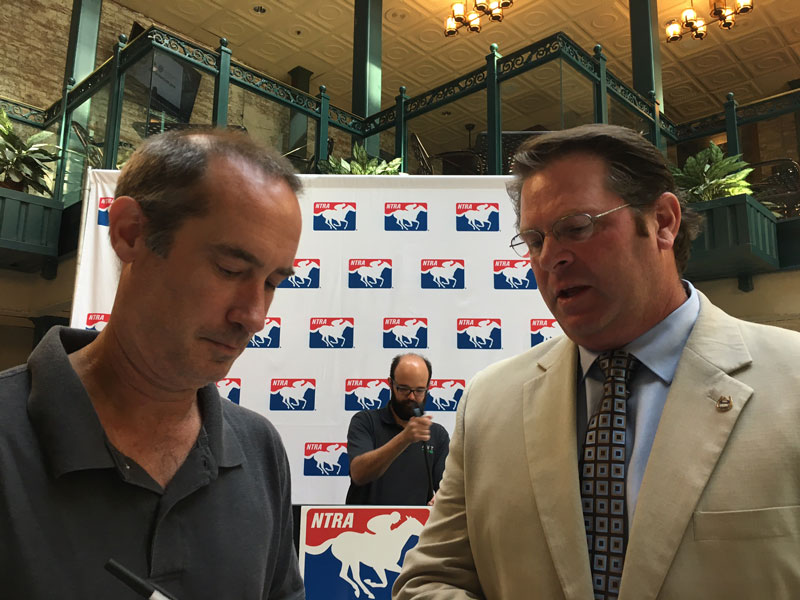
“It’s once again proof of success for our entire industry, through working together for a cause which we all agree benefits everyone,” Hamelback said of the long-sought changes, which could go into effect at some betting outlets as early as Thursday but must be in place by Nov. 14.
The new regulations, announced late Monday by the United States Treasury Department and Internal Revenue Service, take into account how much a bettor actually wagered to hit a big payoff. That generally happens in the multi-horse and multi-race exotic bets that did not exist when the current regulations were created and which assumed the horseplayer invested only $2 instead of possibly hundreds of dollars while betting numerous combinations.
By factoring in a bettor’s total investment — as opposed to only the base dollar amount on which the bet paid off — it will in many instances require much-higher payoffs before the player has to fill out an IRS form in order to cash the ticket. The change also will substantially reduce instances in which players have an automatic 25-percent withheld for federal taxes.
The battle to create equitable taxation regulations that address today’s betting realities has gone on for more than a decade, with organizations such as the National Horsemen’s Benevolent & Protective Association and its state affiliates joining the National Thoroughbred Racing Association’s legislative efforts. The NTRA cites independent estimates that, by allowing horseplayers to keep more of their winnings, wagering in the United States on racing could increase as much as 10 percent — or upwards of $1 billion a year.
“Without a doubt, this is a victory for pari-mutuel wagering customers, but we also see this as a potential major benefit for all owners and trainers,” Hamelback said. “We hope these regulations from the U.S. Treasury positively affect all aspects of our racing industry, from those wagering, which may in turn lead to an increase in handle, thus boosting purse accounts for horsemen and for racetracks. We appreciate all industry stakeholders who put forth efforts and the NTRA Legislative Affairs team for directing these regulations forward.”
Industry stakeholders of course include the bettors, a group that Hamelback observes includes many owners and trainers. A prime example is prominent owner-breeder Ken Ramsey, who used to be known as the “Pick Six King” as a shout-out to his gambling successes. Ramsey was among the thousands of horseplayers and horsemen who wrote and called Treasury and legislators to push for the change.
“It’s one of the greatest things that’s happened in a long time,” Ramsey said of the updated regulations. “If I have to put up a $1,000 to win the Pick Six in order to take multiple horses in different races, instead of giving me credit for betting $1,000, right now they give me credit for betting $2 on the winning (combination) I actually had. I’m not getting any of my investment back. This will put more money back in the horseplayer’s pocket, which he can in turn put back and play another race. It puts more money into the racetracks. And it gives the little guy a chance to stay in the game longer. It’s a very good thing that the horse people have put together.”
Agreed Jeff Platt, president of the Horseplayers Association of North America: “This is great news and couldn’t have come about without thousands of horseplayers letting the U.S. Treasury know that change was long overdue.”
The new rules are scheduled to be officially published in Wednesday’s edition of the Federal Register and will go into full effect by no later than Nov. 14, giving racing associations, totalizator companies and advance deposit wagering (ADW) operators up to 45 days to implement the changes. However, some betting outlets could elect to start as soon as Thursday.
Steve May, director of pari-mutuel wagering for the Kentucky Horse Racing Commission, said totalizator companies that process bets have been planning for months in anticipation of the changes to provide a seamless transition for horseplayers.
“The tireless work of all organizations involved in promoting this fair application of tax law is greatly appreciated,” May said.
May provides this example of how the updated regulations will work:
“Let us say a player invests $48 into 24 combinations of single $2 Pick-4 ticket and has one winning selection that pays $4,235,” he said. “Currently the player would have to fill out a tax form because the winnings were in excess of 300-1 odds on the base $2 wager. This is an undue burden on the horseplayer and the racetrack, and it creates a large amount of unnecessary tax forms. Under the new rules, the same ticket would have to return $14,449 to require IRS paperwork.”
Pictured: National HBPA CEO Eric Hamelback (right) spoke with Daily Racing Form‘s Matt Hegarty Tuesday after a press conference conducted by the National Thoroughbred Racing Association to discuss the long-awaited changes to federal tax regulations on winning wagers (Jennie Rees photo)
The National HBPA (www.hbpa.org) based in Lexington, Ky. is the largest racing horsemen’s representative organization in North America with 30 affiliate organizations and over 30,000 member horsemen. Big Dee’s Tack & Vet Supplies, Lavin Insurance Group LLC, Xpressbet, NTRA Advantage, equineline.com, Red Brand, Finish Line Horse Products Inc. and Horseman Labor Solutions are proud corporate partners of the National HBPA.

 RSS Feed
RSS Feed